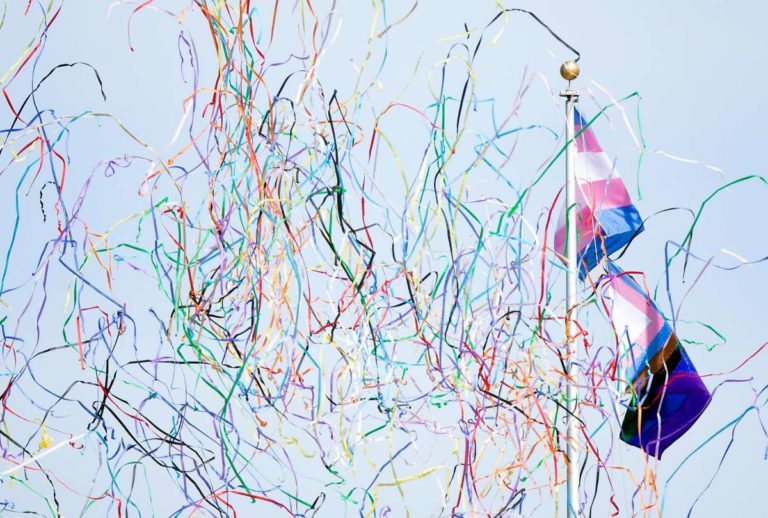
The NFL unveiled a “Pride” themed shield to show its “support and solidarity” with the LGBTQ community. The San Francisco Giants held a Pride Day on Saturday, becoming the first major-league team to wear Pride colors on their uniforms and will soon be selling the same on-field hats that the players wore. The Pac-12 celebrated Pride Month by announcing a partnership with LGBT SportsSafe to help create “a culture of respect and inclusion.”
In American sports, as in much of corporate America, Pride Month seems to have become a box to check. In many ways that’s a good thing: It raises awareness and makes a positive statement.
But is there true conviction behind the multitude of rainbow flags? Or are they a cynical attempt to profit from a segment of the community that isn’t backed up by action?
Let’s start with the Giants. I don’t find their Pride celebrations suspicious. The organization has taken a leadership role, dating to their “’Til There’s a Cure Day” for AIDS awareness at Candlestick Park and “It Gets Better” campaign a decade ago. Proceeds from Saturday’s game against the Cubs will go to SF Pride. The team has historical investment in issues of inclusion and is a leader in baseball (contrast that with the Texas Rangers, next week’s opponent, who remain stubbornly the only major-league team to never host a Pride event).
“It’s not like we all of a sudden jumped on the bandwagon,” said Staci Slaughter, the Giants executive vice president. “Our history and work in this area speaks for itself. We represent the values of the San Francisco community, and the LGBTQ community is a huge part of that.”

But the principal owner of the Giants is Charles Johnson, a billionaire conservative donor who funds many politicians working hard to fight LGBTQ inclusion and equality. Johnson, according to reporting from fivethirtyeight.com last fall, accounted for 32% of all sports ownership donations to Republican causes since 2015.
According to the Giants, an unspecified “portion” of the proceeds from future cap sales will go to LGBTQ charities but the Giants will keep some. So, somewhere there’s a disconnect in buying a Pride-themed cap to represent the team while possibly contributing to the Giants’ coffers and therefore to Johnson’s asset portfolio.
The NFL’s new push for inclusion? Is that like a carbon offset for the millions its owners have poured into conservative candidates over the years, funds that have gone directly to those who work against LGBTQ issues?
The Pac-12, in its Pride Month release, said that it is the first Power Five conference to go “all-in on inclusion” and that it will work with student-athletes to “ensure all members of this invisible minority community feel seen, heard and supported.”
But the Pac-12 is a part of the NCAA. And while the NCAA Board of Governors, in April, warned states weighing anti-transgender athlete bills that they could lose their ability to host events, that threat seemed to be all bark and no bite.
Since the NCAA’s threat, the organization has has held softball playoffs in Florida, Arkansas, Alabama and Tennessee. The softball World Series is in Oklahoma. This weekend the NCAA is holding baseball regionals in Texas, Arkansas and Florida. Those are all states that have either signed or are working on antitransgender athlete bills.
Florida Gov. Ron DeSantis signed an anti-transgender athlete bill Tuesday — his performative way of kicking off Pride Month — and laughed in the face of the NCAA warning. (Johnson, the Giants owner, donated to DeSantis when he was running for U.S. Senate in 2015 before he withdrew from the race, according to FEC filings.)
Chris Mosier, a transgender male athlete and activist, tweeted, “Your actions speak louder than your words @NCAA: you are not protecting the rights of trans and non-binary athletes to participate.”
A spokesperson for the Pac-12, in response to an email query, said that the Pac-12 opposes all anti-transgender bills and laws and worked closely with the University of Utah to defeat such a bill in Utah last February (since then a similar bill has been introduced in Arizona). The spokesperson said jurisdiction over NCAA events is solely up to the NCAA and each Pac-12 school can decide whether or not to participate.
On its website, the NCAA lists LGBTQ resources and states that “as a core value — the NCAA believes in and is committed to diversity, inclusion and gender equity,” among its members. If we are supposed to believe that, then the NCAA has some work to do before it hosts three upcoming Final Fours in Texas and Arizona (2023, ’24 and ’25).
The rainbow-shielded NFL has a Super Bowl slated for Arizona in 2023.
The NBA helped overturn, in part, a North Carolina “bathroom bill” — a precursor to these anti-transgender athlete bills — by moving its All-Star Game out of Charlotte in 2017. The Utah Jazz ownership warned that if the Utah bill passed it could cost the state the 2023 All-Star Game. Will other sports organizations try to fight for change? Will they leverage all the tourism dollars and economic boost their events provide to local economies in an effort to fight hate?
Those are the big economic questions that come with placing a rainbow flag on a product. Rick Welts, the former president of the Warriors, thinks the acknowledgment of Pride Month is an important step forward.
“Men’s pro sports is still trailing women’s sports and society in general,” said Welts, who was Grand Marshal of the San Francisco Pride parade in 2015. “What leagues, teams, players and coaches do and say with their platform is influential and noticed.
“Everyone is welcome here.”
One hopes. And that this isn’t a case of slapping some rainbow flags on a product and adopting the veneer of inclusion simply because it’s June.
Ann Killion is a San Francisco Chronicle columnist. Email: akillion@sfchronicle.com Twitter: @annkillion